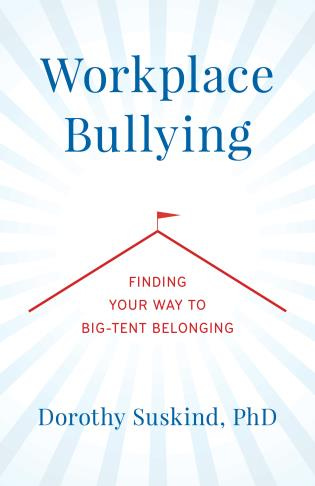Why Do We Stay In Bad Jobs?
Why do we stay in bad jobs?
To answer that question, first we must construe what constitutes bad. For our purposes here, let's define bad as an employment situation that lacks personal fulfillment, professional growth, and/or psychological safety.
In such circumstances, the logical course of action is to search out a new role, within or outside our current employment. Such thinking follows what Thorndike (1898) described well over a century ago as The Law of Effect, in which behaviors that elicit positive results will be repeated and those that bring on negative outcomes will be ceased. Therefore, it is reasonable to assume that we would look to exit work environments that evoke consistent adverse feelings and experiences.
However, when it comes to toxic work cultures, targets are often reluctant to leave, at least initially. Such behavior is puzzling to those on the outside, such as family and close friends, who encourage their loved ones to seek out healthier work spaces (Suskind, 2023).
So, what is going on here?
One explanation is encapsulated in the theory of Escalation of Commitment, a behavior pattern in which following a substantial investment (professional, time, and/or monetary) we persist in a certain direction or on a specific project despite negative external and internal feedback (Staw, 1981). Adverse external feedback might include behaviors typical in a bullying environment like micromanaging, lack of transparency in decision making, manipulation, gossip, sabotage, and exclusion. Internal feedback often manifests as symptoms such as insomnia, stomach pains, migraines, anxiety, or depression. However, despite the unworkability of our current circumstance, we double down on our commitment instead of cutting our losses and searching out new opportunities.
Why?
One explanation for why we stay in a position that at its best doesn’t meet our professional or personal needs and at its worst causes significant health concerns may be related to how we view the larger world (Benschop, Nuijten, Keil, Rohde, Lee, & Commandeur, 2020). Targets of workplace abuse, though unique in many ways, often share what Janoff-Bulman (2010) describes as a benevolent worldview, or a belief that the world and its people are inherently good, and that when given an opportunity, act with dignity, fairness, and compassion. Such a perspective charges us to attribute others’ bad behaviors to misunderstandings instead of purposeful slights.
Goal attainment is another possible reason we double down on our commitment despite glaring evidence that it is a losing fight (Lee, Ryu, Yu, Kim, Oh, 2022). Targets of workplace bullying are often top producers who are dedicated to their organization’s stated mission such as a nurse who takes her lunch hour to read to patients, a teacher who stays after school each day to offer free tutoring to struggling students, or a marketing executive who remains in the office past midnight to perfect the latest pitch for a valued client. Per their goal to operate at their highest professional level, serving those in their care with excellence, it is against their nature to turn their backs, regardless if there is no recognition or reciprocity from upper management.
Similarly, sometimes we have invested an inordinate amount of schooling, money, and time into securing our present position and developing our highly specialized career, that it seems unconscionable to walk away, despite the dire circumstances. This may look like the professor who is reluctant to leave his tenure-track position or the lawyer who is hesitant to walk away from partner, even in light of their toxic work environments.
Lastly, there is some research that shows that though negative emotions in general tend to decrease escalation of commitment, anger conversely heightens our devotion to a dying cause, while subsequently lowering our perception of risk (Tsai & Young, 2010). In cases of workplace bullying, targets’ outrage at the injustice of having to leave a career they love, while the offender gets to stay without consequence, may cause angry feelings that keep them hanging on longer than is in their best interest.
Does it ever get to be too much?
The answer is yes. Per my research and the research of others, after the negative external and internal feedback reaches a critical mass, draining the target of all emotional resources, it may become evident that there is no choice but to walk away (Lee, Keil, & Wong, 2018). Unfortunately, this realization often materializes once the target is too exhausted and too sick to embark on a job search or their reputation has incurred such damage, that their professional marketability is limited.
So, what are some strategies to avoid escalation of commitment?
Let’s start with Annie Duke’s (2022) apt advice in her book Quit: The Power of Knowing When to Walk Away,
“Be picky about what you stick to. Persevere in the things that matter, that bring you happiness, and that move you toward your goals. Quit everything else, to free up those resources so you can pursue your goals and stop sticking to things that slow you down” (p. 178).
Below are five more strategies to avoid escalation of commitment and help you live your best work-life:
Know when to recognize when you are stuck in an escalation of commitment cycle. Use these three questions as a guide:
Have you made a significant time or financial investment into your current project or position?
Are you getting negative external or internal feedback regarding your current project or position?
Do you keep doing the same thing even though the wrong thing keeps happening?
Regardless of your level of satisfaction with your current position, keep your options open. Take the call from the recruiter, and don’t be afraid to jump ship if you get a better offer, even if it feels new and scary. Crafting an exit plan, regardless if you use it, gifts you a sense of freedom, relieving the anxiety of remaining trapped in a dead end situation.
Create a vast professional network that stretches outside your current job and specialty. Difficult work cultures are often isolating. Nurturing a wide and diverse support circle helps to broaden your perspectives, makes you feel less alone, and provides you with a team of people to call upon when you need help or advice.
Foster an identity that encompasses more than just your job title. You are not just a lawyer, or a nurse, or teacher, or a professor. You are a unique individual committed to ________. Fill in the blank here with specifics that speak to your authentic identity, not your business card.
Ask better questions. Instead of inquiring how to make your boss see value in your work, contemplate what mission you want to accomplish here on earth and ask yourself if your current job is the best place to do it?
Remember you are more than just your job title and a world of possibilities stretches beyond your current circumstances. Sometimes all you have to do to see it is look up.
Work Cited
Benschop, N., Nuijten, A. L. P., Keil, M., Rohde, K. I. M., Lee, J. S., & Commandeur, H. R. (2020). Construal level theory and escalation of commitment. Theory and Decision: An International Journal for Multidisciplinary Advances in Decision Science, 91(1), 135–151. https://doi.org/10.1007/s11238-020-09794-w
Duke, A. (2022). Quit: The power of knowing when to walk away. Portfolio/Penguin.
Janoff-Bulman, R. (2010). Shattered assumptions: Towards a new psychology of trauma. New York: Simon and Schuster.
Lee, J. S., Keil, M., & Wong, K. F. E. (2018). Does a tired mind help avoid a decision bias? The effect of ego depletion on escalation of commitment. Applied Psychology, 67(1), 171–185. https://doi.org/10.1111/apps.12109
Lee, H., Ryu, Y. M., Yu, M., Kim, H., & Oh, S. (2022). A qualitative meta-synthesis of studies on workplace bullying among nurses. International Journal of Environmental Research and Public Health, 19(21). https://doi.org/10.3390/ijerph192114120
Staw, B.M. (1981). The escalation of commitment to a course of action. Academy of Management Review, 6(4), 577–587.
Suskind, D. (2023). Closed circles and big tent belonging. A theory of workplace abuse. Rowman and Littlefield.
Thorndike EL (1898) Animal intelligence: An experimental study of the associative processes in animals. Psych. Monographs 2(4):1–109.
Tsai, M.-H., & Young, M. J. (2010). Anger, fear, and escalation of commitment. Cognition & Emotion, 24(6), 962–973. https://doi.org/10.1080/02699930903050631
Two Read
This week I am reading:
The Covenant of Water by Abraham Verghese
Women We Buried, Women We Burned: A Memoir by Rachel Louise Snyder
Book Release
This week the hardback version of my new book Workplace Bullying: Finding Your Way to Big Tent Belonging was released by Rowman and Littlefield. Find the book anywhere books are sold (Rowman and Littlefield, Amazon, Barnes and Noble).
From the Publisher: Workplace Bullying: Finding Your Way to Big Tent Belonging is a lifeline for people who have been targets of workplace abuse and are desperately trying to make sense of the trauma. It is a resource for partners trying to help their loved ones heal. And, it is a toolkit for managers and industry leaders inspiring to create inclusive cultures by proactively addressing toxic behaviors that stagnate innovation, fracture work communities, and drive out top employees. To simplify a complex topic and make the book readable and engaging for a wide audience, the author uses the elements of story to tell the tale of workplace bullying, zooming in on the characters, settings, and plotlines of cultures that allow and/or encourage workplace abuse.
Participate in the Workplace Bullying Study
To deepen my understanding of the impact of workplace bullying on belonging, I have launched a new research study. If you would like to participate anonymously, please click this LINK. I have my university’s IRB approval to do this work.
Reach Out With Questions and Ideas
Some weeks I will share and answer readers’ questions about work-life. If you want to have your question answered anonymously, please share it using this survey link.
I love hearing from readers, so please don’t hesitate to reach out to say hello or suggest topics for me to write about next ~ dorothysuskind@gmail.com.






